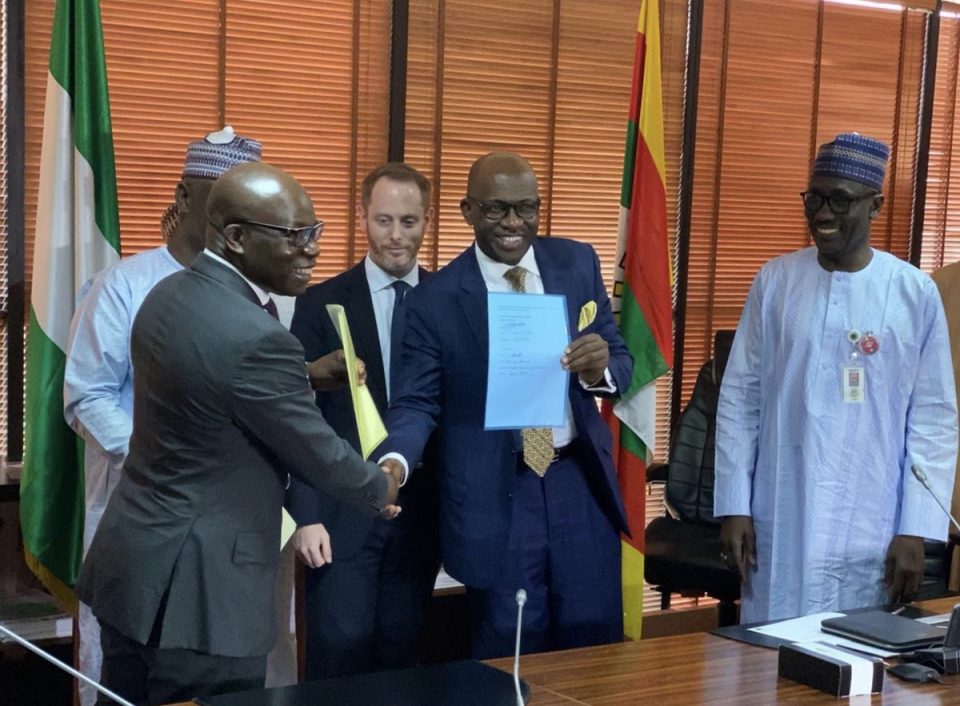The Nigeria’s leading indigenous energy group listed on both the Nigerian and Johannesburg Stock Exchange, through its upstream subsidiary, Oando Energy Resources, today announced the successful signing of two Gas Supply Agreements (GSA) with the Nigeria Liquefied Natural Gas Ltd (NLNG), for the renewal of gas supply for the existing Trains 1-3 for a term of 10 years and for gas supply for the impending Train 7 for a term of 20 years.
Today, under the terms of the current agreement the NAOC Joint Venture (JV) made up of NNPC/NAOC/Oando has a total supply obligation of 850MMScf for Trains 1–6. The JV is specifically responsible for supplying a Daily Contract Quantity (DCQ) of 344.6MMscf/d for Trains 1-3 and 505MMscf/d for Trains 4-6, making the NAOC JV the second largest gas supplier to NLNG. The first GSA is a renewal of the gas supply terms for Trains 1-3.
In addition to the JVs current supply to trains 1-6 and under the terms of the second agreement the JV will be responsible for supplying a DCQ of 294.7MMScf/d for Train 7. Train 7 is expected to come on stream in 2024, and will bring the JV’s total supply obligation to 1.1Bcf. The execution of these agreements also effectively monetizes ca. 3.3Tcf of gas for the NAOC JV of which 666Bcf will be net to Oando.
The NLNG GSAs were signed by Mr. Tony Attah, Managing Director, NLNG; Mr. Massimiliano Bertona, General Manager Commercial & Negotiations, NAOC, representing Managing Director
of NAOC; Alhaji Mansur Sambo, Managing Director, NPDC and Wale Tinubu, Group Chief Executive, Oando PLC and the event was chaired by Mallam Mele Kolo Kyari, Group Managing Director, NNPC.
Commenting on the agreement Mr. Tinubu said: “We are particularly pleased to be the only indigenous company party to the NLNG supply agreement, testament to the potential of local players. The NLNG vehicle will support the Federal Government’s efforts to grow reserves, boost the country’s gas footprint and market share in the global LNG market and in-turn positively develop the Nigerian economy – a goal that we are aligned with and have always wholly endorsed. The signing of these two agreements confirms and consolidates our long-term partnership with NLNG; furthermore it is a validation of NLNG’s confidence in our operational track record. The execution of the GSA is another positive stride in our journey to becoming the leading independent exploration and production company; being a 20 year guaranteed income stream it will strengthen our financial position as well as demonstrate to our key stakeholders the Company’s growth potential. Finally by way of this agreement and in line with our increased focus on sustainability and social impact the JV is closer to its objective of achieving zero gas flare in the immediate future. We will continue to collaborate with our partners and other stakeholders in finding creative solutions to move both the industry and economy forward.”
The execution of the two GSAs is a significant milestone for the Company, its JV partners, and NLNG. It satisfies a condition precedent for NLNG to take its Final Investment Decision (FID) on Train 7 and also guarantees continuous gas supply for its existing trains after the expiration of the current agreements.
About Trains 1 – 7
Trains 1 – 3 are a brain child of the Nigeria LNG, established to tap into Nigeria’s abundant gas resource and monetize it through LNG exports. Final Investment Decision (FID) for the first 2 trains was received in November 1995. Production commenced in September 1999 for Train 2,
while Train 1 started in February 2000. Train 3 commenced production in November 2002 respectively.
The next phase of development called the NLNGPlus project, comprising Trains 4 and 5, commenced in March 2002. Train 4 came on stream in November 2005 and Train 5 was started up in February 2006. The NLNG Six project, consisting of Train 6 and additional condensate processing and LPG storage facilities commenced in 2004. Train 6 became operational in December 2007.
With six trains currently operational, the entire NLNG plant is capable of producing 22 Million Tonnes Per Annum (MTPA) of LNG, and 5 MTPA of NGLs (LPG and Condensate) from 3.5 Billion (standard) cubic feet per day (Bcf/d) of natural gas intake. Gas is supplied via six main dedicated Gas Transmission Systems (GTS) with four of them on-shore. The addition of Train 7 will enhance the total production capacity to over 30 MMTPA of LNG.




